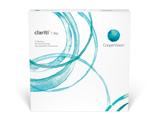
If an apple a day keeps the doctor away, can a carrot a day keep the eye doctor away? Turns out the "food as medicine" movement extends to eye health as well, especially for aging eyes. Certain diet changes can help delay or even prevent some age-related eye diseases such as macular degeneration and cataracts.
Go green (dark leafy greens)
Eating a diet rich in colorful fruits and vegetables affects your overall health as well as the health of your eyes. For example, experts believe cataracts come from an imbalance between free radicals and antioxidants in the body. Two of the best eye-protecting antioxidants are lutein and zeaxanthin, found in dark, leafy greens like kale and spinach.
Fats are good (if you eat the right ones)
Not all fats are created equal. Some fatty acids such as omega-3 fatty acids (DHA, EPA, and ALA) help protect against macular degeneration and decrease the risk of glaucoma. Researchers at the National Eye Institute (NEI) found in the 2009 Age-Related Eye Disease Study that participants who reported the highest level of omega-3 fatty acids in their diet were 30 percent less likely than others to develop macular degeneration during a 12-year period.
Less is more (when it comes to salt)
Government guidelines recommend that people consume less than 2,300 milligrams of sodium per day -- about one teaspoon of salt. Most Americans consume 3,500 milligrams, a majority of which is snuck into processed foods. Many people know a diet full of sodium puts you at risk for heart disease, but may not realize high salt intake may increase your risk for cataracts too, according to a University of Sydney study.
Making changes to one’s lifestyle and diet can be as challenging as it is rewarding. If you’ve adopted a healthy diet and need help getting all you need for good eye health, consider eye supplements which can fill in the nutritional gaps.





